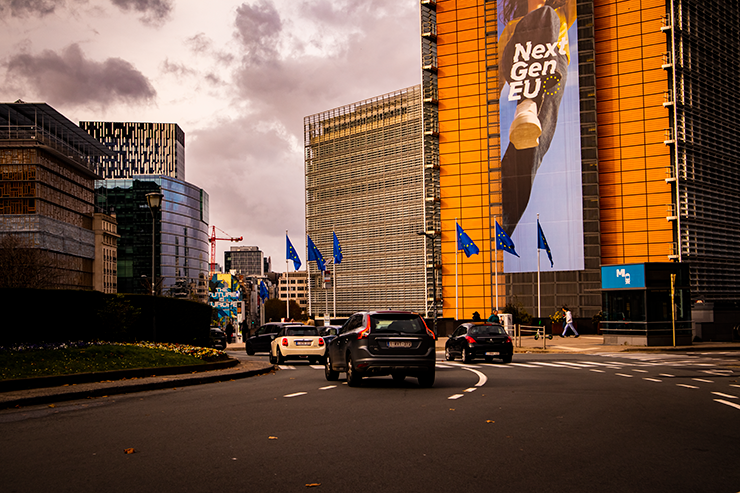Babel in Brussels
“I only speak French with my beautician,” says Magdalena, a 30-year old Pole living in Brussels since 2015, while enjoying a coffee at Place de Luxembourg, facing the seat of the European Parliament. Like her, 270thousand nationals of other EU countries or the United Kingdom live in the Belgian capital, i.e. 22% of the total. Most are the same age, and this square is one of their favourite meeting venues.
They often work in the buildings of the European institutions or at related companies, in what is locally known as the Brussels Bubble or EU Bubble. And sometimes it really looks like a bubble separated from the rest of the city, with dedicated public concerns, insurance and medical services, gyms, and even reference newspapers. All these services are provided in English, a language that is used for all daily chores in the Bubble.
Magdalena is the public relations manager of an association of companies. She speaks English with her co-workers, as well as when not at work. “I never had problems, except at translating some annoying administrative papers from the municipal offices,” she says. French and Flemish, a variant of Dutch, are the official languages of the Brussels Capital region, which is, in fact, a large metropolitan area made up of 19 adjoining municipalities. All public notices, road signs, and supermarket labels are bilingual, even if most people ignore both versions. “English is actually the third main language, not least because French and Dutch speakers already use it to communicate among them,” says Catherine Xhardez from the Brussels University, an expert of immigration and integration into the city. Her studies highlight the specificity of a place that, as such, has no well-defined identity.
French and Flemish, a variant of Dutch, are the official languages of the Brussels Capital region, which is, in fact, a large metropolitan area made up of 19 adjoining municipalities. All public notices, road signs, and supermarket labels are bilingual, even if most people ignore both versions. “English is actually the third main language, not least because French and Dutch speakers already use it to communicate among them,” says Catherine Xhardez from the Brussels University, an expert of immigration and integration into the city. Her studies highlight the specificity of a place that, as such, has no well-defined identity.
Wallonia and the Flanders, the other two regions that make up Belgium, request that incoming non-European nationals attend an “integration course”. However, there are two ethnic-linguistic communities in Brussels, and each has developed its own potentially competing integration course. A political agreement was painfully made in 2017 on a “choice-based” system, which is still not compulsory. Dualism characterizes both the integration offering and the entire cultural and educational landscape of the city, from schools to theatre shows, which inevitably favour either language. According to the scholar, newcomers may be confused about this situation, being inevitably forced to “decide on which side they want to be”.
Most finally prefer to use English or, in some cases, tend to continue to speak their language of origin. The high rate of foreign residents allows more recent immigrants to rely on broad networks of co-nationals, something that surely helps satisfy basic needs, but may impact negatively on their social engagement.
“Brussels is the most cosmopolitan city in the world, but this doesn’t mean it is a happy haven for co-habiting,” says Marco Martiniello, Director of the Centre for Ethnic Studies and Migrations of the Liege University (Cedem). According to recent data of the national statistics institute, the Brussels region has more than one-third non-indigenous residents: over 432thousand out of a total of one million 220thousand inhabitants. Alongside these 35.4% foreigners, there are 39.5% Belgians with at least one parent of a different nationality: the “Belgians born from Belgians” are thus just one-fourth of the overall Brussels population, while they account for 67.3% at national level. According to Martiniello, this unique multi-ethnicity occurs on a highly fragmented urban space, fraught with racial and socio-economic barriers.
The different “souls” of Brussels meet downtown. In the other cities, which are also non-homogeneous from the ethnic viewpoint and subject to continuous demographic change, there is often a prevalent community, such as Moroccans in Molenbeek or Turks in Schaerbeek. There are also wealthy and “white” areas, and both characters tend to go hand in hand. “There are no immigrants here, just expats from Europe, Japan, or the US,” says Martiniello, ironically stressing the different perception generated by foreign communities according to their origin and purchasing power.
Tell me where you come from and I will tell you who you are
In Brussels, like in the rest of the Country, the origin is crucial to determine the outcome of integration. This is shown by such data as the employment rate of foreign nationals recorded in a recent StatBel survey: 72.6% for Europeans, 45.7% for all the others. “While Belgium is certainly not like South Africa in the age of the apartheid, structural ethnicity-based discriminations exist in almost all social domains: accommodation, education, labour market,” says Martiniello.
Challenges are even harder for illegal immigrants, foreign nationals without a valid stay permit to live in Belgium. According to estimates, albeit necessarily inaccurate, there are 80 to 150thousand on the national territory. However, the general term “illegal immigrants” does not provide a proper definition of the complexity and variety of their conditions.
Many of them are in transit, heading towards the UK. According to the data of the Immigration Office, the police halted 4,238 in 2020, and more than twice as many in 2019. However, real numbers must be higher: the French minister of the Interior Gérald Darmanin recently said that half of the people that try to cross the Channel illegally come from Belgium. Eritrea, Algeria, and Sudan are the most common countries of origin of those that are known as “migrants in transit”. In some cases they travel to reach England, in others they were denied asylum in a EU Country. Sometimes they do not apply for asylum in Belgium even if they would be entitled to humanitarian protection, simply because no one told them they can do so”, says Katya Spallina, a long-time volunteer in the sector.
The transit city
At first Katya Spallina handed out clothes in the streets but soon opened here apartment to people that had no place to sleep. “At some point in time, I gave the keys to the association, and new people kept coming,” she says. It wasn’t easy from the emotional point of view, because they were all very young people, who often stayed a couple of nights and then tried to secretly board a ship. “Every day I kept saying “good luck” and “let me know”. Most were pushed back and returned to Brussels, but soon tried again.”
This home-based hot-spot network disappeared in time, but many homes are still provided for free by private citizens, and several associations manage support centres at different locations in town.
One of the busiest is the Porte d’Ulysse, in the city of Schaerbeek, where homeless foreigners can stay, with volunteers preparing their meals. D., a smiling Ethiopian national in his twenties, is waiting outside the door. He left his Country at 13 and crossed the Mediterranean sea on a boat at 15 to reach Europe. After a few days in Sicily and one week at a centre in Milan, he left towards Germany to reach some relatives but, after working there for six years, he was denied renewal of his stay permit.
So he resumes his journey: “The day after tomorrow I will go to Calais and, at night, I will try to get into the load compartment of a truck when the driver sleeps or leaves the cockpit.” There will be checks, both upon boarding in France and upon landing in the UK harbour, but he hopes he can avoid them. He says that two people out of ten usually succeed in reaching the other side, and that some of his acquaintances tried dozens of times but failed. “You can hide from the police, but you have no way out when they come with the dogs. After all, it is just a matter of luck.” He shows a photo of his 3-year old son on his phone and ensures it is worth running the risk of being intercepted and rejected. “In the UK I will be able to work. I intend to apply for asylum, and sooner or later my family will join me.”
Illegal immigrants
On the other side of the city, there are some that would never leave Brussels. At the church of Saint Jean Baptiste au Béguinage, not far from the main square, an Islam praying carpet is spread near the altar. The believers do not come here for the mass, but rather to bring convenience items to dozens of people taking refuge under the arcade, who share the condition of illegal immigrants. Some have been living and working illegally in Belgium for years, others lost a regular job, others yet lost their stay permit for temporarily returning to their Country of origin.
“This is our last chance. If there were another way to stay legally, we wouldn’t be here,” firmly says Tarik Chaoui, spokesman of the Union of illegal immigrants for legalization (USPR). His background is a paradox: in 2013 he left Morocco to join his mother, brother, and sister, who had migrated to Brussels two years earlier. Meanwhile, though, migration policies had changed in Belgium and he, unlike his family, could never obtain a stay permit.
Last summer, 470 illegal immigrants started a hunger strike, barricaded in this church and in the seats of two universities, to urge the national government to grant a pardon. The case was widely discussed, because the left-wing parties that support the governing coalition in Belgium threatened to make the government collapse in case someone died.
Tarik participated in negotiations with Sammy Mahdi, Secretary of State for asylum and migrations and son of an Iraqi refugee. After almost two months, an agreement was made to stop the strike, something that the spokesman of USPR regrets today: “They told us to submit individual applications, that they would approve positive cases, but three-quarters of the replies obtained so far are negative.” This was highly disappointing for those that expected a softer attitude from a political representative born from immigrants.
The problem is that the Belgian legislation has no clear criteria for the legalization of foreigners who already live in the Country. Article 9bis of the law of December 15, 1980 provides for “exceptional circumstances” to authorize residence, but only describes the procedure, without specifying the necessary parameters: in practice, the Office for Foreigners reviews each individual case based on the characteristics of each file. Language skills, the years spent in the Country, and the level of integration are in favour of the applicant. Any criminal records and inappropriate behaviours are rated negatively. According to the USPR, this is a totally arbitrary system, considering that very similar situations can generate opposite outcomes. However, a bill of law for the introduction of well-defined criteria, supported by a small opposition party, was recently rejected by the Belgian parliament.
Laws and slogans
However, the true barriers to the opening to irregular residents include the institutional structure and the political scenario of Belgium. Stay permits, in fact, are issued by the federal authorities, whereas labour permits are issued by the regional authorities. The latter cannot be obtained without the former, except in one case (permis B) in which, however, the applicant should reside outside the national territory, and the bureaucratic duties are entrusted to the employer: this prevents illegal immigrants from settling their position at local level, where it would probably be easier. “If the Brussels region were in charge of migrations, we would already have obtained our papers. But Belgium includes the Flanders…,” says Tarik with a frown.
Migration policies, in fact, are managed at national level and were a crucial part of the negotiations that resulted into the formation of the government of Alexander De Croo in October 2020. The coalition supporting the Prime Minister is ironically known as “Vivaldi”, because it includes the political correspondents of the four seasons: right-wingers, liberals, socialists, and ecologists.
Such an alliance was created to exclude from the government the two main parties in Parliament by number of votes: the New Flemish Alliance (NVA), an expression of the nationalist right-wing in the Flanders, and the separatists of the ultra-right wing of Vlaams Belang (Flemish Interest), so much radical as to be subject to the political embargo of all the other parties.
“It is a crucial issue in their narrative, which sees immigrants as a risk for security and a burden for the State’s finance,” says sociologist Jean-Michel Lafleur. “As it happened in other European countries, this exploitation of migrations lowered the quality of the debate and also influenced the other political forces.” The “contamination effect” is an important part of the agenda of moderate Flemish parties: the conservatives of Cd&V (including the secretary for asylum and migrations) and the liberals of Open Vld want to use an iron hand with irregular migrants to avoid a sovereigntist and xenophobic rhetoric.
The invisible
Illegal immigrants thus become the “victims of a political and ideological game,” according to Cécile de Blic, who coordinates the protest at the Béguinage church as a volunteer. She arrived in Brussels from Bretagne in July and immediately took this struggle to heart. “Illegal immigrants are modern slaves: people that live in the country and are prone to exploitation, because they have no civil rights.”
Due to their status, they are often forced to work in inappropriate conditions, with low wages and exhausting shifts in the basements of food stores or on industrial equipment without a health insurance coverage. Having no stay permit, they cannot rent a home with a legal contract or receive medical care, except in case of emergency. They can enrol their children in school, but these will lose their right to study upon turning 18, says Cécile.
For the volunteer, “these people are virtually invisible to the State” and, while they have been members of the Belgian society for years, they remain hostages to a narrative that sees them as foreign bodies. “This happens because they come from North Africa or the Middle East. I am French, and no one in Brussels ever blamed me for this.”
The Italians in this mosaic
The large Italian community is generally welcome and is well integrated into the social texture, according to Raffaele Napolitano, president of the Committee of Italians Abroad (Comites) in Brussels, Brabant, and Flanders. In addition to the 274thousand official residents in the Country, others live in Belgium without residence – a composite and varied migration flow that started far back in time.
“Today mostly university students, new graduates attracted by the job opportunities offered by the European institutions, and young professionals come to Brussels. Here they meet the offspring of the immigrants of the past century,” says Napolitano. The geographic layout has deeply changed compared to thirty years ago, he argues: back then, entire districts were inhabited by Italians, who today are rather scattered across the city. The integration level is such that Italian nationals may reach the highest levels in every sector: the best example is probably the socialist representative Elio Di Rupo, son of workers from Abruzzo who moved to Belgium in 1947 and Prime Minister of Belgium from 2011 to 2014.
However, today’s immigrants can also hope they will be “bon étranger” in the future. “What people say about Moroccans in Brussels today was referred to the Italians in the 1960s,” says Giuseppe Canta while filling a cardboard cup with a take-away portion of pasta with minced meat sauce. He was born in Brussels in 1983 from a Sicilian mother and an Apulian father: his parents came as children with his grandparents, in a migration wave of Italians that were often meant to work in the coal mines of Wallonia.
At his stall he prepares meals for the workers in the industrial district of Evere, not far from the European Commission’s seat: they seem to appreciate the specialties of “Pepe Pasta,” who also displays his origin in the counter’s colours. From his maternal grandmother he learned Italian with a strong accent and some old-fashioned terms, but only speaks French at home by now. Selena and Tanina, his two youngest daughters, will be “Belgians of Belgian descent” in the official statistics. Data, figures, and boxes capable to photograph, but without ever truly focusing on, the unfathomable cultural mosaic of this city.














